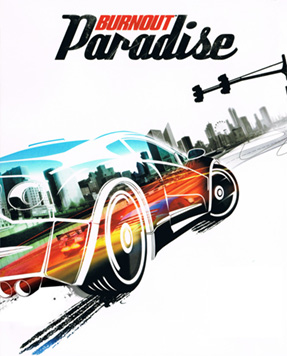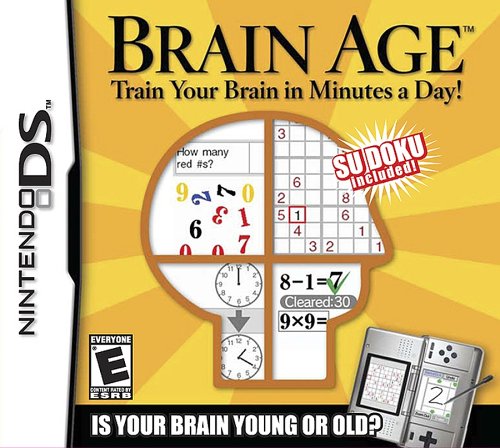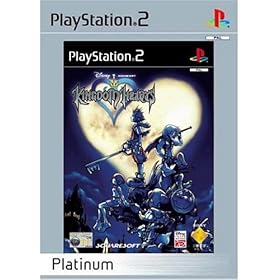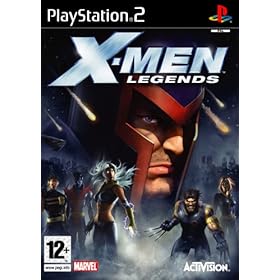I didn't manage to play any games this week, but there's lots of stuff to come. I've got various articles I need to read and write up and these are currently on my "to play" list:
Total Annihilation
Total Annihilation: Kingdoms
Supreme Commander
X-men Legends II: Rise of Apocalypse
X-men: Next Dimension
Mortal Kombat: Shaolin Monks
Monday, 25 February 2008
Saturday, 16 February 2008
07/02/08 - 14/02/08
Games I've been playing this week:
I've played a fair few games over 3 different systems this week, a Playstation 3, an Xbox and my Playstation 2.
PS3:
 Ratchet and Clank Future: Tools of Destruction: (Demo) Seems like a great game from what I've seen. Very enjoyable and reminds me a bit of Sonic Adventure on the Dreamcast (but without the focus on speed). Definitely delivers on the PS3's graphics potential.
Ratchet and Clank Future: Tools of Destruction: (Demo) Seems like a great game from what I've seen. Very enjoyable and reminds me a bit of Sonic Adventure on the Dreamcast (but without the focus on speed). Definitely delivers on the PS3's graphics potential.
 Timeshift: (Demo) I've never been a big fan of FPS games as I always find aiming difficult, but the Timeshift ability definitely helps with that. The Timeshift ability also makes for some great effects. Definitely a game I'd pick up if I owned a PS3 (or Xbox 360, or a good enough PC).
Timeshift: (Demo) I've never been a big fan of FPS games as I always find aiming difficult, but the Timeshift ability definitely helps with that. The Timeshift ability also makes for some great effects. Definitely a game I'd pick up if I owned a PS3 (or Xbox 360, or a good enough PC).
 Burnout: Paradise: (Demo) Another great game graphically, though (as my friend Alex pointed out) the "shininess" of the graphics means they tend to lack a certain realism. The demo didn't really allow much scope to check out what you could do, but mostly it was just fun crashing the car and watching it in spectacular slow motion.
Burnout: Paradise: (Demo) Another great game graphically, though (as my friend Alex pointed out) the "shininess" of the graphics means they tend to lack a certain realism. The demo didn't really allow much scope to check out what you could do, but mostly it was just fun crashing the car and watching it in spectacular slow motion.
Nucleus: A simple little game that wasn't really that interesting. Definitely not something I'd choose over playing something else on the PS3.
 Lego Star Wars: The Complete Saga: A very fun game that's great to play with someone else, especially as it allows you to attack their character (at one point I had to stop playing as I was laughing too hard from doing this). There's some great touches in it, like C-3PO hopping around with missing limbs after being attacked, or how silly Chewbacca looks with a Stormtrooper helmet on.
Lego Star Wars: The Complete Saga: A very fun game that's great to play with someone else, especially as it allows you to attack their character (at one point I had to stop playing as I was laughing too hard from doing this). There's some great touches in it, like C-3PO hopping around with missing limbs after being attacked, or how silly Chewbacca looks with a Stormtrooper helmet on.
PS2:
 Burnout 3: Takedown: Obviously the graphics aren't as good as "Paradise", but still a great game. Obviously being a full game rather than just a demo, there's a lot more scope to do things. It strikes me as a game for people who don't necessarily "like" racing games. It rewards bad driving and crashes (though winning a race will also help) and various other things along those lines. I've always been someone who never wanted to learn exactly when to brake in order to take a certain corner best or whatever, preferring instead to see what stupid things I can do with my car to entertain myself. Definitely the perfect racing game for me.
Burnout 3: Takedown: Obviously the graphics aren't as good as "Paradise", but still a great game. Obviously being a full game rather than just a demo, there's a lot more scope to do things. It strikes me as a game for people who don't necessarily "like" racing games. It rewards bad driving and crashes (though winning a race will also help) and various other things along those lines. I've always been someone who never wanted to learn exactly when to brake in order to take a certain corner best or whatever, preferring instead to see what stupid things I can do with my car to entertain myself. Definitely the perfect racing game for me.
 Hitman: Contracts: An interesting game that I haven't played much. It's definitely a game I'll have to spend some time on, as I've never been good at being stealthy in games. Some initial gripes were that the joystick set-up was confusing, but I found I could change that, and that I couldn't read the health meter very well, but I soon worked it out after I'd been shot at a lot and subsequently died.
Hitman: Contracts: An interesting game that I haven't played much. It's definitely a game I'll have to spend some time on, as I've never been good at being stealthy in games. Some initial gripes were that the joystick set-up was confusing, but I found I could change that, and that I couldn't read the health meter very well, but I soon worked it out after I'd been shot at a lot and subsequently died.
Xbox:
 Batman Begins: Initially picked up for my housemate as Gamestation didn't have any more games available that she wanted and I knew she liked the film. A straightforward and enjoyable game with some nice touches (like how when you're near an enemy, you hear their heartbeat and the controller rumbles with each beat). It's been criticised for being too simple, but for someone like me or my housemate, it's perfect. Plus, being Batman is awesome!
Batman Begins: Initially picked up for my housemate as Gamestation didn't have any more games available that she wanted and I knew she liked the film. A straightforward and enjoyable game with some nice touches (like how when you're near an enemy, you hear their heartbeat and the controller rumbles with each beat). It's been criticised for being too simple, but for someone like me or my housemate, it's perfect. Plus, being Batman is awesome!
 Rayman 3: Hoodlum Havoc: This game is very much a platform game. A good game with some great humorous touches. However, the transition sections between worlds where you have to skate along platforms and jump onto another as one ends, can become rather tedious as they are quite long.
Rayman 3: Hoodlum Havoc: This game is very much a platform game. A good game with some great humorous touches. However, the transition sections between worlds where you have to skate along platforms and jump onto another as one ends, can become rather tedious as they are quite long.
I've played a fair few games over 3 different systems this week, a Playstation 3, an Xbox and my Playstation 2.
PS3:
 Ratchet and Clank Future: Tools of Destruction: (Demo) Seems like a great game from what I've seen. Very enjoyable and reminds me a bit of Sonic Adventure on the Dreamcast (but without the focus on speed). Definitely delivers on the PS3's graphics potential.
Ratchet and Clank Future: Tools of Destruction: (Demo) Seems like a great game from what I've seen. Very enjoyable and reminds me a bit of Sonic Adventure on the Dreamcast (but without the focus on speed). Definitely delivers on the PS3's graphics potential. Timeshift: (Demo) I've never been a big fan of FPS games as I always find aiming difficult, but the Timeshift ability definitely helps with that. The Timeshift ability also makes for some great effects. Definitely a game I'd pick up if I owned a PS3 (or Xbox 360, or a good enough PC).
Timeshift: (Demo) I've never been a big fan of FPS games as I always find aiming difficult, but the Timeshift ability definitely helps with that. The Timeshift ability also makes for some great effects. Definitely a game I'd pick up if I owned a PS3 (or Xbox 360, or a good enough PC). Burnout: Paradise: (Demo) Another great game graphically, though (as my friend Alex pointed out) the "shininess" of the graphics means they tend to lack a certain realism. The demo didn't really allow much scope to check out what you could do, but mostly it was just fun crashing the car and watching it in spectacular slow motion.
Burnout: Paradise: (Demo) Another great game graphically, though (as my friend Alex pointed out) the "shininess" of the graphics means they tend to lack a certain realism. The demo didn't really allow much scope to check out what you could do, but mostly it was just fun crashing the car and watching it in spectacular slow motion.Nucleus: A simple little game that wasn't really that interesting. Definitely not something I'd choose over playing something else on the PS3.
 Lego Star Wars: The Complete Saga: A very fun game that's great to play with someone else, especially as it allows you to attack their character (at one point I had to stop playing as I was laughing too hard from doing this). There's some great touches in it, like C-3PO hopping around with missing limbs after being attacked, or how silly Chewbacca looks with a Stormtrooper helmet on.
Lego Star Wars: The Complete Saga: A very fun game that's great to play with someone else, especially as it allows you to attack their character (at one point I had to stop playing as I was laughing too hard from doing this). There's some great touches in it, like C-3PO hopping around with missing limbs after being attacked, or how silly Chewbacca looks with a Stormtrooper helmet on.PS2:
 Burnout 3: Takedown: Obviously the graphics aren't as good as "Paradise", but still a great game. Obviously being a full game rather than just a demo, there's a lot more scope to do things. It strikes me as a game for people who don't necessarily "like" racing games. It rewards bad driving and crashes (though winning a race will also help) and various other things along those lines. I've always been someone who never wanted to learn exactly when to brake in order to take a certain corner best or whatever, preferring instead to see what stupid things I can do with my car to entertain myself. Definitely the perfect racing game for me.
Burnout 3: Takedown: Obviously the graphics aren't as good as "Paradise", but still a great game. Obviously being a full game rather than just a demo, there's a lot more scope to do things. It strikes me as a game for people who don't necessarily "like" racing games. It rewards bad driving and crashes (though winning a race will also help) and various other things along those lines. I've always been someone who never wanted to learn exactly when to brake in order to take a certain corner best or whatever, preferring instead to see what stupid things I can do with my car to entertain myself. Definitely the perfect racing game for me. Hitman: Contracts: An interesting game that I haven't played much. It's definitely a game I'll have to spend some time on, as I've never been good at being stealthy in games. Some initial gripes were that the joystick set-up was confusing, but I found I could change that, and that I couldn't read the health meter very well, but I soon worked it out after I'd been shot at a lot and subsequently died.
Hitman: Contracts: An interesting game that I haven't played much. It's definitely a game I'll have to spend some time on, as I've never been good at being stealthy in games. Some initial gripes were that the joystick set-up was confusing, but I found I could change that, and that I couldn't read the health meter very well, but I soon worked it out after I'd been shot at a lot and subsequently died.Xbox:
 Batman Begins: Initially picked up for my housemate as Gamestation didn't have any more games available that she wanted and I knew she liked the film. A straightforward and enjoyable game with some nice touches (like how when you're near an enemy, you hear their heartbeat and the controller rumbles with each beat). It's been criticised for being too simple, but for someone like me or my housemate, it's perfect. Plus, being Batman is awesome!
Batman Begins: Initially picked up for my housemate as Gamestation didn't have any more games available that she wanted and I knew she liked the film. A straightforward and enjoyable game with some nice touches (like how when you're near an enemy, you hear their heartbeat and the controller rumbles with each beat). It's been criticised for being too simple, but for someone like me or my housemate, it's perfect. Plus, being Batman is awesome! Rayman 3: Hoodlum Havoc: This game is very much a platform game. A good game with some great humorous touches. However, the transition sections between worlds where you have to skate along platforms and jump onto another as one ends, can become rather tedious as they are quite long.
Rayman 3: Hoodlum Havoc: This game is very much a platform game. A good game with some great humorous touches. However, the transition sections between worlds where you have to skate along platforms and jump onto another as one ends, can become rather tedious as they are quite long.
Thursday, 14 February 2008
I are serious cat. This is serious game.
Some thoughts on Serious/Simulation gaming.
So, serious games are games intended solely for learning/training purposes. This raises a question; why are they used and why do they work? Looking at games in general, they all involve learning in some way. At the base level, you need to learn the various interfaces and control systems used in the game and (preferably) how to use these effectively. Then you need to learn the strategy level of a game. This is a broad level and depends on the game you are playing. In a game like Tetris, you simply need to learn how to get the most points and how to stay playing for as long as possible. In a more complex game, such as a real-time strategy or city management game, these strategies would be more complex and may seem counter-intuitive at times as complex games will not always offer a clear line of sight to your "end goal".
The question of why these games work can be answered by this look at games (meaning being able to play multiple games well, rather than just a specific game or a specific genre of games). The most effective way to be good at games is not to understand the "how" of playing a game, but to understand the "why" of playing the game. This means to understand the fundamental aspects of why what you do in a game works. This means you develop skills that can be applied elsewhere, rather than simply to one game.
This leads on to answering the question of why the games are used. While there are other concerns, such as cost or the fact that "on the job" training would be impossible (or irresponsible), the main reason should be this disambiguation of skills. You don't need to train people to push a button (or if you do, you don't need an expensive simulation to do it), you need to train people to understand why they are pushing a button. This is also useful as otherwise you'd end up with people trained to be good at simulations rather than real life situations.
This reminds me a lot of the training games in Ender's game, where the recruits play games in order to develop strategic skills. These games are basically simulations of the battles they would ultimately end up fighting, but they are still very unlike the battles themselves. In the end, the students end up playing a "game" that turns out to not be a simulation. (Interestingly, the Wikipedia article on America's Army compares it to these games).
This brings me to simulation games. Mostly it brings me to various games made by Will Wright (such as SimCity and The Sims). It makes me think of how, often the most effective games as learning tools, are ones where you don't realise you're meant to be learning. This took me back to a talk by Will Wright at TED, where he talks about designing games that are "learning toys" and his upcoming game, "Spore". In these games, the object is not to "win", as the games are open-ended (much like Tetris), but instead focuses on "not losing" for as long as possible.
So, serious games are games intended solely for learning/training purposes. This raises a question; why are they used and why do they work? Looking at games in general, they all involve learning in some way. At the base level, you need to learn the various interfaces and control systems used in the game and (preferably) how to use these effectively. Then you need to learn the strategy level of a game. This is a broad level and depends on the game you are playing. In a game like Tetris, you simply need to learn how to get the most points and how to stay playing for as long as possible. In a more complex game, such as a real-time strategy or city management game, these strategies would be more complex and may seem counter-intuitive at times as complex games will not always offer a clear line of sight to your "end goal".
The question of why these games work can be answered by this look at games (meaning being able to play multiple games well, rather than just a specific game or a specific genre of games). The most effective way to be good at games is not to understand the "how" of playing a game, but to understand the "why" of playing the game. This means to understand the fundamental aspects of why what you do in a game works. This means you develop skills that can be applied elsewhere, rather than simply to one game.
This leads on to answering the question of why the games are used. While there are other concerns, such as cost or the fact that "on the job" training would be impossible (or irresponsible), the main reason should be this disambiguation of skills. You don't need to train people to push a button (or if you do, you don't need an expensive simulation to do it), you need to train people to understand why they are pushing a button. This is also useful as otherwise you'd end up with people trained to be good at simulations rather than real life situations.
This reminds me a lot of the training games in Ender's game, where the recruits play games in order to develop strategic skills. These games are basically simulations of the battles they would ultimately end up fighting, but they are still very unlike the battles themselves. In the end, the students end up playing a "game" that turns out to not be a simulation. (Interestingly, the Wikipedia article on America's Army compares it to these games).
This brings me to simulation games. Mostly it brings me to various games made by Will Wright (such as SimCity and The Sims). It makes me think of how, often the most effective games as learning tools, are ones where you don't realise you're meant to be learning. This took me back to a talk by Will Wright at TED, where he talks about designing games that are "learning toys" and his upcoming game, "Spore". In these games, the object is not to "win", as the games are open-ended (much like Tetris), but instead focuses on "not losing" for as long as possible.
Friday, 8 February 2008
31/01/08 - 07/02/08
Games I've been playing this week:
So, this week I borrowed a Nintendo DS (not the lite, we're not that posh) from the IOCT, along with a couple of games.

Brain Age: Quite addictive, especially Sudoku (which I'd previously never played before). It can get quite frustrating though, such as when you write the correct answer and it misreads it and marks you down! I think I got my brain age down to 27 at one point, which was nice. Mostly it was just nice to work on my mental maths for the first time in ages.
 The Sims 2: I was rather confused by this game. I've played the first Sims game and I was expecting a similar thing, where I'd build a house and fill it with people and try to keep them happy. Instead I was thrown into what seemed very much like an RPG, where I had to collect objects and complete mission goals. Other than the fact that I had some sort of relationship with other Sims and I could move furniture around, there didn't seem to be much in common with the normal Sims game. Building things and putting things in them has always been my favourite part of sim/management games, so this game was fairly disappointing (yes, I'm the guy who makes sure he buys enough benches to be put against all the walls in Theme Hospital).
The Sims 2: I was rather confused by this game. I've played the first Sims game and I was expecting a similar thing, where I'd build a house and fill it with people and try to keep them happy. Instead I was thrown into what seemed very much like an RPG, where I had to collect objects and complete mission goals. Other than the fact that I had some sort of relationship with other Sims and I could move furniture around, there didn't seem to be much in common with the normal Sims game. Building things and putting things in them has always been my favourite part of sim/management games, so this game was fairly disappointing (yes, I'm the guy who makes sure he buys enough benches to be put against all the walls in Theme Hospital).
So, this week I borrowed a Nintendo DS (not the lite, we're not that posh) from the IOCT, along with a couple of games.

Brain Age: Quite addictive, especially Sudoku (which I'd previously never played before). It can get quite frustrating though, such as when you write the correct answer and it misreads it and marks you down! I think I got my brain age down to 27 at one point, which was nice. Mostly it was just nice to work on my mental maths for the first time in ages.
 The Sims 2: I was rather confused by this game. I've played the first Sims game and I was expecting a similar thing, where I'd build a house and fill it with people and try to keep them happy. Instead I was thrown into what seemed very much like an RPG, where I had to collect objects and complete mission goals. Other than the fact that I had some sort of relationship with other Sims and I could move furniture around, there didn't seem to be much in common with the normal Sims game. Building things and putting things in them has always been my favourite part of sim/management games, so this game was fairly disappointing (yes, I'm the guy who makes sure he buys enough benches to be put against all the walls in Theme Hospital).
The Sims 2: I was rather confused by this game. I've played the first Sims game and I was expecting a similar thing, where I'd build a house and fill it with people and try to keep them happy. Instead I was thrown into what seemed very much like an RPG, where I had to collect objects and complete mission goals. Other than the fact that I had some sort of relationship with other Sims and I could move furniture around, there didn't seem to be much in common with the normal Sims game. Building things and putting things in them has always been my favourite part of sim/management games, so this game was fairly disappointing (yes, I'm the guy who makes sure he buys enough benches to be put against all the walls in Theme Hospital).
Thursday, 7 February 2008
A massively effective piece of reporting
You've gotta love Fox news, haven't you? Perfectly "Fair and balanced", isn't it? Mostly ignoring the actual expert on the game and instead having a lengthy discussion with people who've never even been near the game and have no clue what it's actually like.
Fortunately, EA have hit back. They haven't threatened legal action, they've just sent them a letter. It's one of those beautiful letters that calls them all idiots without actually having to come out and say it.
Of course, if you want to skip the sex scenes in Mass Effect, you can just choose the "British" option...

Friday, 1 February 2008
24/01/08 - 31/01/08
Games I've been playing this week:
 Kingdom Hearts: Been playing this for a while and I still love it. I'm currently on the Atlantica (Little Mermaid) level. It's not too hard, so I don't get frustrated, but it's not like Final Fantasy X where I feel like I may as well just be watching a film so I could do away with having to press some buttons...
Kingdom Hearts: Been playing this for a while and I still love it. I'm currently on the Atlantica (Little Mermaid) level. It's not too hard, so I don't get frustrated, but it's not like Final Fantasy X where I feel like I may as well just be watching a film so I could do away with having to press some buttons...
 X-men Legends: An X-men RPG? I am quite obviously in heaven. The 2-player mode is great too, as it's a welcome change to be working with a partner rather than against them. Especially enjoyed the part of a mission where pretty much everything could be destroyed...
X-men Legends: An X-men RPG? I am quite obviously in heaven. The 2-player mode is great too, as it's a welcome change to be working with a partner rather than against them. Especially enjoyed the part of a mission where pretty much everything could be destroyed...
 Capcom Vs. SNK 2: A very frustrating game. The controls are simple (like most fighting games), but getting to do anything other than simple moves is a lot more difficult. We read through the instructions multiple times and still had no idea. Not to mention having no clue what the various "grooves" did...
Capcom Vs. SNK 2: A very frustrating game. The controls are simple (like most fighting games), but getting to do anything other than simple moves is a lot more difficult. We read through the instructions multiple times and still had no idea. Not to mention having no clue what the various "grooves" did...
 Kingdom Hearts: Been playing this for a while and I still love it. I'm currently on the Atlantica (Little Mermaid) level. It's not too hard, so I don't get frustrated, but it's not like Final Fantasy X where I feel like I may as well just be watching a film so I could do away with having to press some buttons...
Kingdom Hearts: Been playing this for a while and I still love it. I'm currently on the Atlantica (Little Mermaid) level. It's not too hard, so I don't get frustrated, but it's not like Final Fantasy X where I feel like I may as well just be watching a film so I could do away with having to press some buttons... X-men Legends: An X-men RPG? I am quite obviously in heaven. The 2-player mode is great too, as it's a welcome change to be working with a partner rather than against them. Especially enjoyed the part of a mission where pretty much everything could be destroyed...
X-men Legends: An X-men RPG? I am quite obviously in heaven. The 2-player mode is great too, as it's a welcome change to be working with a partner rather than against them. Especially enjoyed the part of a mission where pretty much everything could be destroyed... Capcom Vs. SNK 2: A very frustrating game. The controls are simple (like most fighting games), but getting to do anything other than simple moves is a lot more difficult. We read through the instructions multiple times and still had no idea. Not to mention having no clue what the various "grooves" did...
Capcom Vs. SNK 2: A very frustrating game. The controls are simple (like most fighting games), but getting to do anything other than simple moves is a lot more difficult. We read through the instructions multiple times and still had no idea. Not to mention having no clue what the various "grooves" did...
Labels:
atlantica,
capcom,
final fantasy,
kingdom hearts,
little mermaid,
snk,
x-men
Subscribe to:
Comments (Atom)

